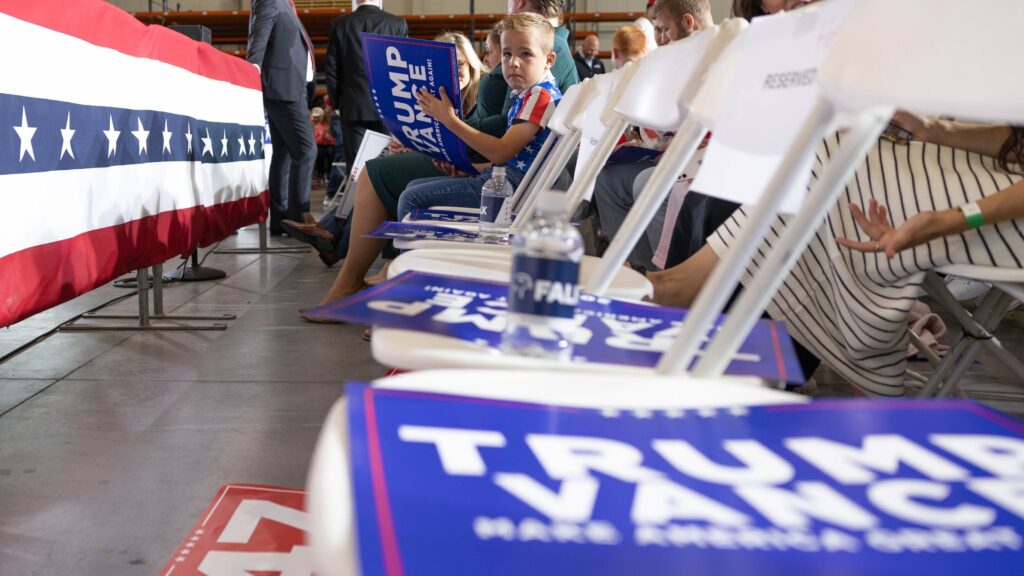Samuel J. Robinson
Oprah Winfrey recounted an interaction she had with a Black man at the airport last month before a campaign event in Farmington Hills with Vice President Kamala Harris who said he would vote for Trump.
“He said, ‘I’m voting for Trump because you gave me that check,'” Winfrey told the audience. “I heard from some guy that he got a check. He gave us a check. So forget everything else. It’s about the check.”
The Trump supporters’ comments are familiar to black voters across the country and in Detroit.
Popular rappers hint at it in interviews and songs. Detroit’s Babyface Ray’s 2021 hit song “If You Know You Know” features the hook, “Tip it, pass it like a deck of cards.”
And it all stems from pandemic relief checks of up to $1,200 and $600 sent out in March and December 2020. Another check for up to $1,400 was sent out in March 2021 as part of the American Rescue Plan Act signed into law by President Joe. Biden.
Many credit Mr. Trump with these funds and with Congress’ Paycheck Protection Program (PPP), which he signed into law. The PPP funds were intended to help small businesses stay afloat amid pandemic closures and economic uncertainty. Ultimately, he scrambled to get his name on the checks days before the payments were due and signed the stimulus package along with the annual spending bill.
“That money was taxpayer money,” said former state Rep. Shelley Gay Danyogo. “During COVID-19, Congress passed a bill to move that money. People don’t even understand the process, so we need to go back to school and teach civics. That money. It didn’t come out of Trump’s pocket, it didn’t go to Congress, it was the opposite. Trump insisted that he sign the check.”
Martel Bibbings, a Black Republican who is running against Rep. Shri Thanedar (D-Detroit) in the 13th Congressional District, is also listening to suggestions from voters. He says it all comes down to people having more money in their pockets under the Trump administration. “And it’s extremely disrespectful for someone, even a Democrat, to try to diminish someone else’s lived experience,” he said.
“Yes, Congress passed it, but Mr. Trump was smart enough to know that if he redacted his name to it, a lot of people would see it when Mr. Trump received his check. ” Bibbings said.
President Trump threatened to cancel a second pandemic relief package after demanding that stimulus checks be increased from $600 to $2,000. Bibbings believes the former president is popular in the black community and could loosen the Democratic Party’s grip on the black vote. In 2020, Trump received 40% more votes across Detroit than in 2016.
“We’re going to get the most votes in Detroit that he’s ever had. He’s going to go to the inner city to get those votes and he’s going to continue to do that,” Trump’s campaign said. spokeswoman Victoria Lacivita told the Free Press.
Kamau Clark of the advocacy group We the People MI said he has heard from people who are also giving credit for the stimulus checks to Trump. Direct funding is unique and felt by everyone, but the challenge with a Biden victory is that it’s not felt by everyone, he said.
“Biden has come up with some good policies, like the Anti-Inflation Act and lower health care costs, but the stimulus checks were something that everyone was feeling,” Clark said.
Clark believes part of the problem lies in the mystification of what happens in politics.
“Most people don’t know about the American political process or what powers the president has, and the same goes for members of Congress,” Clark said.
“Democrats need to do a better job of talking to ordinary people about everyday issues,” said Brendan Snyder, executive director of Detroit Action, a local nonprofit aimed at connecting working-class voters. ” he says. “Some of the people we need are talking about Trump. We need to be able to do the same for our neighbors.”
The Harris campaign has been door-knocking in the Detroit area, hosting events with prominent voices such as Rep. Maxine Waters (D-Calif.). Sen. Cory Booker, D-N.J. U.S. Representative Maxwell Frost (D-Florida). It also features faith leaders and local influencers who speak to Black voters, including contestants from the television series “Scandal,” reality TV star and Big Brother champion Taylor Hale, and viral rapper Zemac Cash. did.
“Every day we are here in Detroit and Flint reminding Black voters not only of how Trump hurt our communities last time, but of his extreme policies, divisive rhetoric, and racist metaphors. “It’s a reminder of how we are turning back the clock on decades of progress for Black communities,” said Harris spokesman Eddie McDonald.
But Gay Danyogo contends that the Harris campaign hasn’t worked with the right agents in the Detroit area to go and sit down and talk with potential voters in person.
“The problem is that no one is empowering the right surrogates to go out and have these big conversations,” Gay Danyogo said. “Democrats have a right to go into the election with confidence, but we can’t have confidence and do nothing,” she said. “If no one responds or refutes the message, the message remains and that’s the problem.”
Samuel J. Robinson is a freelance contributor to the Free Press specializing in election misinformation. Contact him at X:@samueljrob.
Want to learn more about this year’s Michigan elections? Check out our voter guide, subscribe to our election newsletter, and feel free to share your thoughts with us at any time in a letter to the editor.

